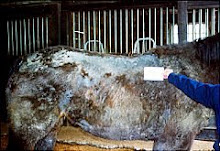
Rescue is expensive, but Terri Stemper has plenty of love – and friends to help with the feedings.
By Dan Huntley
dhuntley@charlotteobserver.com
Posted: Sunday, Mar. 22, 2009
Slideshow
Terri Stemper watches the foals at the Dream Equine Therapy Center, off S.C. 32 near Brattonsville. DIEDRA LAIRD – dlaird@charlotteobserver.com
To purchase this photo | Browse our store
Two of the foals soak up the sun. “Some of the neediest horses are these unwanted foals, some as young as a day old,” said Terri Stemper. DIEDRA LAIRD – dlaird@charlotteobserver.com
To purchase this photo | Browse our store
Dream Equine Therapy Center director Terri Stemper works with several of her five foals ranging in age from 1-3 weeks. Her boyfriend, Mark Hill, watches two more from the foals' barn in the background. DIEDRA LAIRD – dlaird@charlotteobserver.com
To purchase this photo | Browse our store
More Information
Suburban horse country
South Charlotte's suburbs are home to thousands of horse owners, riders, retailers and other equine enthusiasts.
Most horses are located in Union and York counties. But many owners and riders hail from southern Mecklenburg.
Here are some facts about our love of horses:
Union County's horse industry is No. 2 in the state and generates an estimated $18 million annually, according to N.C. agriculture officials and an N.C. Rural Center study.
Union has about 10,000 horses and 120 horse farms of five or more horses, according to a census by Jimmy Jackson, co-owner of High Hope Stables in Union County, a 21-acre farm caring for 17 horses.
York County has an estimated 8,100 horses and 50 farms of five or more horses, according to Carol Deacon, president of the S.C. Horsemen's Council.
Want to know more?
Contact the N.C. Regional Equine Information Network System through the N.C. Cooperative Extension: http://www.ces.ncsu.edu/. Visit the Union County chapter of REINS at www.reinsunioncounty.org/home.
For the Dream Equine Therapy Center, visit www.dreamequinetherapycenter.org. E-mail Terri Stemper at detc@comporium.net or call 803-980-8422.
ROCK HILL Terri Stemper has an expensive habit she can't seem to shake – she rescues orphaned baby horses.
“It's my weakness, I've been around horses since I was 7 years old. I can't stand to see a horse suffer,” said Stemper, 30. “And some of the neediest horses are these unwanted foals, some as young as a day old, that are taken from their mothers at birth.”
Stemper works as a registered nurse during the day but the rest of the time she runs the Dream Equine Therapy Center on her five-acre farm in western York County.
The center cares for and finds homes for orphaned horses. At the moment, she's caring for 15 adult horses and five foals. The foals need to be fed a milk formula every four hours around the clock, and the stalls' pine shaving floors need to be emptied twice daily. Neighbors and volunteers help with the horses when she's at work.
Stemper used to work in a veterinary clinic near Lexington, Ky. There she learned a dirty little secret of the thoroughbred horse breeding business.
Horses are big business in the Bluegrass State, with mares worth $200,000 and more. Top-of-the-line mares give birth to foals that are handed off to nurse mares of lesser breeds. That's so the thoroughbred mare can be quickly bred again. The catch is that the offspring of the nurse mares are practically worthless to the horse breeders. They sometimes end up at feedlots where they are eventually slaughtered to be sold as a delicacy food in Europe or Asia, or as pony leather for belts, shoes and purses.
Stemper works with a network of horse rescue agencies in the Midwest that buy the foals from breeders for $100 to $300. Stemper and her boyfriend, Mark Hill, transport foals back to her farm.
She presently has five foals who range in age from one week to three weeks. She plans to take in another 20 foals this spring. The couple care for the foals until homes can be found. In order to adopt the foals, clients must provide background information and prove they have adequate facilities to provide for the horses. They pay a fee of about $500.
On a recent afternoon, the gangly foals were nudging each other, kicking their skinny legs and licking the gated doors of their stalls.
“They're just babies and they're attempting to nurse, so they are constantly licking,” Stemper said as she rubbed the nose of a chestnut foal named Phoebe.
Neighbor Gina Chapman says Stemper is a rare breed.
“I don't know how she does it. She takes better care of those foals than some people do of their children,” Chapman said with a laugh. “It's a money-losing operation with feeding and the vet bills for these horses, but that doesn't slow Terri down. Her heart is in it, and she won't stop until she finds a good home for each of her horses.”
Stemper, who used to work with terminally ill cancer patients, says the name for her center came from her work on the cancer ward.
“I guess I was always talking about my horses and the patients would talk about how they dreamed of someday seeing my horses and riding them. And I got to thinking about how therapeutic it could be for them,” she said. “Well, that's part of my dream too – to save these nurse mare foals and help people get their mind off their illnesses.
“Horses can do some amazing things. I've seen them.”
http://www.charlotteobserver.com/276/story/611804.html

















1 comment:
Never thought that horse rescuing is expensive too. But I know that for the “horsemanship” sake, they will rescue them whatever they costs.
Post a Comment